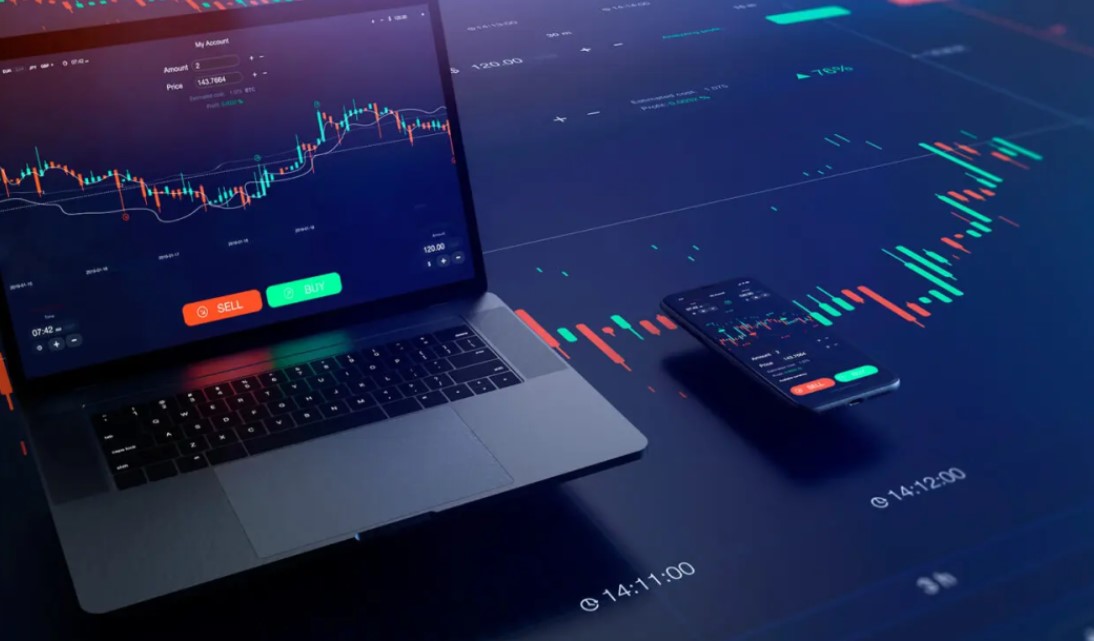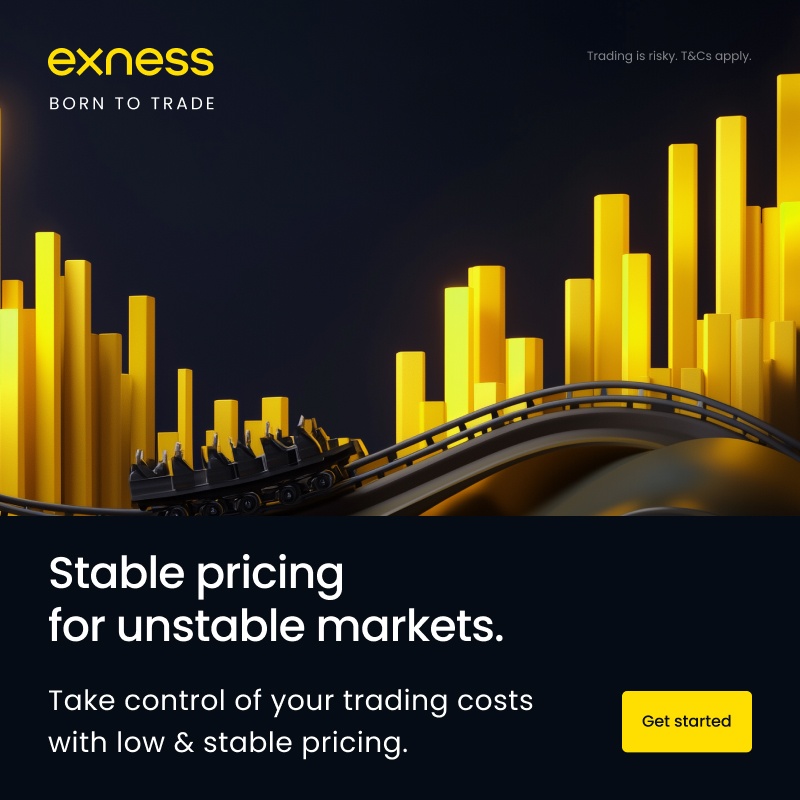
10 minute read
How to Start Forex Trading in Nigeria: A Comprehensive Guide
from Exness
by Exness_Blog
Forex trading has become increasingly popular in Nigeria, offering individuals a chance to earn income by trading global currencies. With the rise of internet access and mobile trading platforms, more Nigerians are diving into the world of foreign exchange (forex) trading. However, starting forex trading in Nigeria requires knowledge, preparation, and discipline to succeed in this dynamic financial market.
Top 4 Best Forex Brokers in Nigeria
1️⃣ Exness: Open An Account or Visit Brokers 🏆
2️⃣ XM: Open An Account or Visit Brokers 💥
3️⃣ JustMarkets: Open An Account or Visit Brokers ✅
4️⃣ Quotex: Open An Account or Visit Brokers 🌐
In this comprehensive guide, we’ll walk you through everything you need to know to start forex trading in Nigeria, from understanding the basics to choosing the right broker and developing a winning strategy. Whether you’re a complete beginner or looking to refine your approach, this article will equip you with the tools to embark on your forex trading journey confidently.
What Is Forex Trading?
Forex trading, short for foreign exchange trading, involves buying and selling currencies to profit from fluctuations in their exchange rates. The forex market is the largest and most liquid financial market globally, with a daily trading volume exceeding $7 trillion. In Nigeria, forex trading has gained traction due to its accessibility and potential for high returns, provided traders approach it with the right mindset and skills.
Currencies are traded in pairs, such as USD/NGN (US Dollar/Nigerian Naira) or EUR/USD (Euro/US Dollar). When you trade forex, you speculate on whether one currency will rise or fall in value against another. For example, if you believe the US dollar will strengthen against the Nigerian Naira, you might buy the USD/NGN pair.
Why Forex Trading Is Popular in Nigeria
Forex trading appeals to Nigerians for several reasons:
· Accessibility: All you need is a smartphone or computer, an internet connection, and a small amount of capital to start trading.
· Flexible Hours: The forex market operates 24 hours a day, five days a week, allowing Nigerians to trade at their convenience.
· Low Entry Barrier: Many brokers offer accounts with low minimum deposits, making forex trading accessible to beginners.
· Economic Opportunities: With Nigeria’s economic challenges, such as naira volatility, forex trading offers a way to hedge against currency fluctuations and generate income.
However, forex trading carries significant risks, and success requires education, practice, and discipline. Let’s explore how to get started.
Step-by-Step Guide to Start Forex Trading in Nigeria
1. Educate Yourself About Forex Trading
Before diving into forex trading, it’s crucial to understand the market’s fundamentals. Here are some key concepts to learn:
· Currency Pairs: Major pairs (e.g., EUR/USD), minor pairs, and exotic pairs (e.g., USD/NGN).
· Pips and Lots: A pip is the smallest price movement in a currency pair, while a lot represents the trade size.
· Leverage and Margin: Leverage allows you to control larger positions with smaller capital, but it also increases risk.
· Technical and Fundamental Analysis: Technical analysis involves studying charts and indicators, while fundamental analysis focuses on economic events and news.
Resources for Learning:
· Online courses on platforms like Udemy or Coursera.
· Free forex tutorials on YouTube or blogs like BabyPips.
· Books such as “Currency Trading for Dummies” or “The Little Book of Currency Trading.”
In Nigeria, you can also join local forex trading communities on platforms like WhatsApp, Telegram, or X to learn from experienced traders.
2. Choose a Reliable Forex Broker
Selecting a reputable forex broker is critical to your success. A broker acts as an intermediary between you and the forex market, providing a platform to execute trades. Here’s what to consider when choosing a broker in Nigeria:
· Regulation: Ensure the broker is regulated by a reputable authority, such as the Financial Conduct Authority (FCA), Cyprus Securities and Exchange Commission (CySEC), or the Securities and Exchange Commission (SEC) in Nigeria.
· Trading Platform: Popular platforms like MetaTrader 4 (MT4) or MetaTrader 5 (MT5) are user-friendly and widely used in Nigeria.
· Deposit and Withdrawal Options: Look for brokers that support local payment methods like bank transfers, mobile money (e.g., Flutterwave, Paystack), or cryptocurrencies.
· Spreads and Fees: Compare spreads (the difference between buy and sell prices) and commissions to minimize trading costs.
· Customer Support: Choose a broker with responsive support, ideally available in Nigeria’s time zone.
Popular Forex Brokers in Nigeria:
· Exness
· HotForex (HFM)
· FXTM (ForexTime)
· OctaFX
· Deriv
Always research a broker’s reputation by reading reviews on platforms like Trustpilot or checking discussions on X to avoid scams.

💥 Trade with Exness now: Open An Account or Visit Brokers 🏆
3. Open a Forex Trading Account
Once you’ve chosen a broker, follow these steps to open a trading account:
· Visit the Broker’s Website: Sign up by providing your personal details, such as name, email, and phone number.
· Verify Your Identity: Submit identification documents (e.g., international passport, driver’s license, or national ID) and proof of address (e.g., utility bill).
· Choose an Account Type: Brokers offer various account types, such as micro, standard, or ECN accounts. Beginners should start with a micro or demo account to practice.
· Fund Your Account: Deposit funds using a payment method convenient for Nigerians, such as bank cards, mobile money, or crypto wallets. Many brokers accept deposits as low as $5–$10.
4. Practice with a Demo Account
Before risking real money, practice trading on a demo account. A demo account allows you to trade with virtual funds in real-market conditions, helping you:
· Familiarize yourself with the trading platform.
· Test trading strategies without financial risk.
· Build confidence in analyzing charts and making trades.
Most brokers offer unlimited demo accounts, so take your time to practice until you’re comfortable with the process.
5. Develop a Trading Strategy
A solid trading strategy is essential for consistent success in forex trading. Your strategy should align with your risk tolerance, financial goals, and trading style. Common trading styles include:
· Day Trading: Opening and closing trades within a single day.
· Swing Trading: Holding trades for several days or weeks to capture larger price movements.
· Scalping: Making quick trades to profit from small price changes.
Key Components of a Trading Strategy:
· Entry and Exit Rules: Define when to enter and exit trades based on technical indicators (e.g., moving averages, RSI) or price patterns.
· Risk Management: Never risk more than 1–2% of your account balance on a single trade. Use stop-loss orders to limit losses.
· Trading Plan: Outline your goals, preferred currency pairs, and trading hours.
For example, a beginner in Nigeria might focus on major pairs like EUR/USD due to their liquidity and lower spreads, using technical indicators like support and resistance levels to identify trade opportunities.
6. Fund Your Trading Account
After practicing on a demo account, deposit funds into your live trading account. In Nigeria, funding options vary by broker but often include:
· Bank Transfers: Most brokers accept deposits via Nigerian banks like GTBank, Zenith, or Access Bank.
· Mobile Money: Platforms like Flutterwave and Paystack are popular for quick deposits.
· Cryptocurrencies: Some brokers accept Bitcoin or USDT for faster, low-cost transactions.
Start with a small amount you can afford to lose, as forex trading involves significant risks. For example, depositing $50–$100 is sufficient for a micro account.
7. Start Trading and Monitor Your Progress
Once your account is funded, you can start trading. Follow these tips to trade effectively:
· Stay Disciplined: Stick to your trading plan and avoid emotional decisions.
· Monitor Economic News: Events like US Federal Reserve interest rate decisions or Nigerian inflation reports can impact currency prices.
· Keep a Trading Journal: Record your trades, including entry/exit points, profits, losses, and lessons learned.
· Avoid Overtrading: Limit the number of trades to avoid burnout and excessive risk.
Use tools like economic calendars (available on sites like Investing.com) to stay updated on market-moving events.
Common Mistakes to Avoid in Forex Trading
As a beginner in Nigeria, steer clear of these pitfalls:
· Lack of Education: Trading without understanding the market can lead to significant losses.
· Overleveraging: High leverage can amplify profits but also magnifies losses. Use leverage cautiously.
· Ignoring Risk Management: Failing to set stop-loss orders or risking too much per trade can wipe out your account.
· Chasing Losses: Avoid trying to recover losses by making impulsive trades.
· Falling for Scams: Beware of brokers or “mentors” promising guaranteed profits. Always verify their credibility.
Legal and Regulatory Considerations in Nigeria
Forex trading is legal in Nigeria, but it’s largely unregulated. The Central Bank of Nigeria (CBN) oversees financial markets, but no specific forex trading regulations exist. This makes it critical to choose a broker regulated by international authorities to ensure your funds’ safety.
Additionally, be aware of Nigeria’s foreign exchange policies. The CBN occasionally imposes restrictions on naira-based transactions, which may affect funding or withdrawing from your trading account. Using cryptocurrencies or e-wallets can help bypass some of these challenges.
Tips for Success in Forex Trading
· Stay Updated: Follow global economic news and Nigeria-specific events that impact the naira, such as oil price changes or CBN policies.
· Join a Community: Engage with Nigerian forex trading communities on X, Telegram, or local seminars to share knowledge and stay motivated.
· Continuous Learning: The forex market evolves, so keep learning through webinars, books, and courses.
· Manage Emotions: Greed and fear can lead to poor decisions. Stay calm and stick to your strategy.
· Start Small: Begin with a small investment and scale up as you gain experience.
Challenges of Forex Trading in Nigeria
While forex trading offers opportunities, Nigerians face unique challenges:
· Internet Connectivity: Unreliable internet can disrupt trading. Use a stable connection or mobile data as a backup.
· Power Supply: Frequent power outages may affect trading. Consider investing in a reliable power source, like an inverter.
· Currency Volatility: The naira’s fluctuations can impact trading, especially for USD/NGN pairs.
· Scams: Fraudulent brokers and Ponzi schemes targeting Nigerian traders are common. Always verify a broker’s credentials.
How Much Can You Earn from Forex Trading in Nigeria?
Earnings from forex trading depend on your capital, strategy, and risk management. For example:
· With a $100 account and a 2% daily return (a realistic target for skilled traders), you could earn $2 per day or $40–$60 per month.
· However, losses are also possible, especially for beginners. Focus on consistent small gains rather than expecting quick riches.
Professional traders with larger accounts and years of experience may earn significantly more, but this requires time and dedication.
Conclusion
Forex trading in Nigeria offers an exciting opportunity to participate in the global financial markets, but it’s not a get-rich-quick scheme. By educating yourself, choosing a reliable broker, practicing with a demo account, and developing a disciplined trading strategy, you can increase your chances of success. Avoid common mistakes, stay updated on market trends, and leverage Nigeria’s growing forex community for support.
Ready to start your forex trading journey? Begin with small steps, stay patient, and keep learning. With time and effort, you can navigate the forex market confidently and work toward financial independence.
💥 Note: To enjoy the benefits of the partner code, such as trading fee rebates, you need to register with Exness through this link: Open An Account or Visit Brokers 🏆
Read more:

